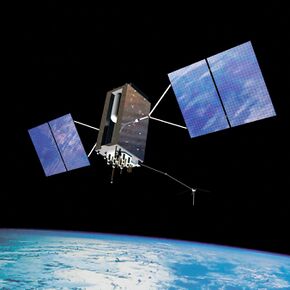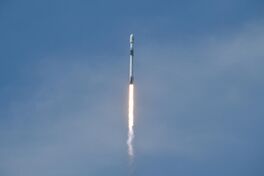USA-304
Topic: Engineering
 From HandWiki - Reading time: 4 min
From HandWiki - Reading time: 4 min
 Artist's rendering of GPS-III SV03 in orbit | |
| Names | Navstar 79 GPS-III SV03 Matthew Henson |
|---|---|
| Mission type | Navigation |
| Operator | United States Air Force |
| COSPAR ID | 2020-41A |
| SATCAT no. | 45854 |
| Mission duration | 15 years (planned) |
| Spacecraft properties | |
| Spacecraft | GPS-III SV03 |
| Spacecraft type | GPS Block III |
| Manufacturer | Lockheed Martin |
| Launch mass | 4311 kg |
| Power | watts |
| Start of mission | |
| Launch date | 30 June 2020, 20:40 UTC |
| Rocket | Falcon 9 B1060.1 |
| Launch site | Cape Canaveral Air Force Station , SLC-40 |
| Contractor | SpaceX |
| Orbital parameters | |
| Reference system | Geocentric orbit |
| Regime | Medium Earth orbit (Semi-synchronous orbit) |
| Perigee altitude | 20,164 km (12,529 mi) |
| Apogee altitude | 20,214 km (12,560 mi) |
| Inclination | 55.2° |
| Period | 718.0 minutes |
USA-304, also known as GPS-III SV03 or Matthew Henson,[n 1] is a United States navigation satellite which forms part of the Global Positioning System. It was the third GPS Block III satellite to be launched.[2]
Satellite
SV03 is the third GPS Block III satellite to be launched. Ordered in 2008, launch was pushed back several times to 2020 due to delays with the first and second satellites.[3]
The spacecraft is built on the Lockheed Martin A2100 satellite bus, and weighs in at 4,311 kg (9,504 lb).[4]
Launch
USA-304 was launched by SpaceX on 30 June 2020 at 20:10 UTC atop Falcon 9 booster B1060.[2] The launch took place from SLC-40 of the Cape Canaveral Air Force Station , and placed USA-304 directly into semi-synchronous orbit. About eight minutes after launch, Falcon 9 B1060 successfully landed on Just Read the Instructions.[5]
Orbit
As of 2021, USA-304 was in a 55.2 degree inclination orbit with a perigee of 20,164 kilometers (12,529 mi) and an apogee of 20,214 km (12,560 mi).[6]

Notes
References
- ↑ Clark, Stephen (2 October 2020). "Space Force announces new nicknames for GPS satellites". Spaceflight Now. https://spaceflightnow.com/2020/10/02/space-force-announces-new-nicknames-for-gps-satellites/.
- ↑ 2.0 2.1 Atkinson, Ian (30 June 2020). "SpaceX launches third GPS Block III satellite" (in en-US). https://www.nasaspaceflight.com/2020/06/spacex-launch-third-gps-block-iii-satellite/.
- ↑ "SMC and SpaceX launch third GPS III satellite" (in en-US). 30 June 2020. https://www.gpsworld.com/smc-and-spacex-poised-for-third-gps-iii-falcon-9-launch/.
- ↑ "GPS-3 (Navstar-3)" (in en). https://space.skyrocket.de/doc_sdat/navstar-3.htm.
- ↑ Clark, Stephen. "Timeline for Falcon 9's launch of the GPS 3 SV03 spacecraft – Spaceflight Now" (in en-US). https://spaceflightnow.com/2020/06/30/timeline-for-falcon-9s-launch-of-the-gps-3-sv03-spacecraft/.
- ↑ "Technical details for satellite NAVSTAR 79 (USA 304)". https://www.n2yo.com//satellite/?s=45854.
 |
 KSF
KSF